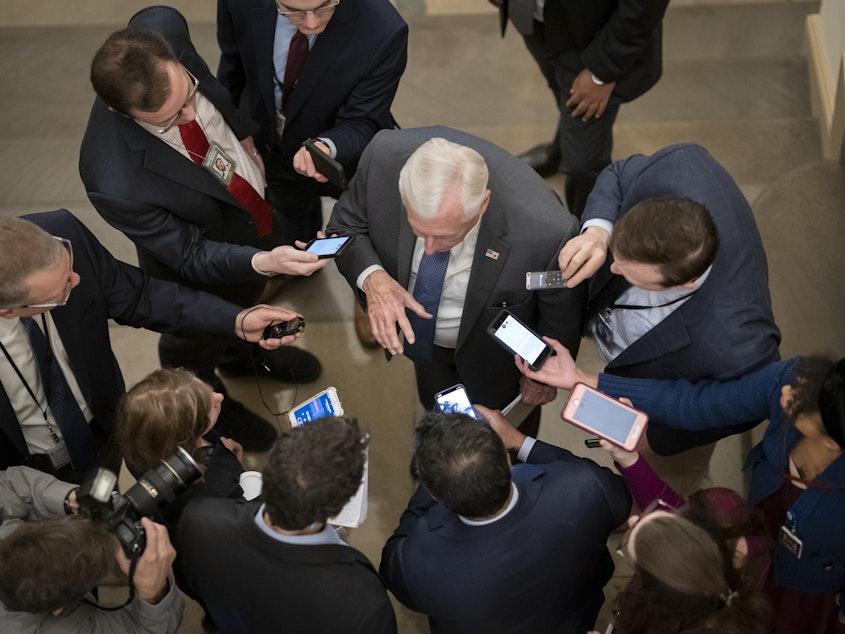Negotiations Wear On Over Coronavirus Relief Bill, Republicans Await Trump's Support

Negotiations wore on Friday between House Speaker Nancy Pelosi and the Trump administration over a relief bill for the coronavirus pandemic, although it wasn't clear what it might include or when it might take effect.
Updated at 3:42 p.m. ET
Pelosi continued a days-long string of phone calls with Treasury Secretary Steven Mnuchin about priorities for the package.
She and House Democratic leaders had hoped to fast-track legislation they unveiled earlier this week but so far discussions with Republicans about possible changes haven't gone smoothly enough to permit that.
Rules Committee Chairman Jim McGovern of Massachusetts told reporters on Friday that the speedy process the House might have used isn't guaranteed.
Sponsored
Instead he said it'll be up to Republicans, led in the House by Rep. Kevin McCarthy of California, to determine how many votes they'll be able to deliver depending on the final version of the bill.
McGovern said that he's confident that the results of Pelosi's and Mnuchin's negotiations will be palatable for most members.
"I think if you brought this to the floor there would be bipartisan support," McGovern said.
Pelosi had spoken with Mnuchin half a dozen times by mid-day in Washington, the speaker's office said.
Pelosi then addressed TV cameras in the Capitol to deliver a statement about what she called the most urgent priorities involved with the pandemic, which she boiled down in three words: "testing, testing, testing."
Sponsored
The government must furnish as many virus tests as are needed in order to get a sense about the number of people who have been infected, which can then inform what follows, Pelosi said.
"We can only defeat this outbreak if we have an accurate determination of its scale and scope, so we can pursue the appropriate, science-based response that is necessary," she said.
Pelosi took no questions, including one shouted by a reporter after her remarks as to whether Trump supports her legislation.
McCarthy, for his part, headed to the White House mid-day on Friday for further discussions, but when he returned to the Capitol he declined to talk to reporters.
Trump declared a national emergency related to the pandemic in a press conference on Friday afternoon at the White House.
Sponsored
Separately, House Majority Leader Steny Hoyer, D-Md., sent a letter to House Democrats Friday afternoon noting that the speaker has "literally been working around the clock" on a deal. But he said if one was not reached "we will vote today on our bill, which incorporates nearly all of what the Administration and Republicans have requested."
Opposition to "bloat"
Several Hill Republicans have said they are worried that the latest version of the bill is "bloated" and have been unwilling to make a final call on their support until the text is released.
There are also concerns among some GOP lawmakers that President Trump has not explicitly embraced the legislation, potentially leaving Republicans open to attacks if they vote for something Trump does not support.
The particulars in dispute include the economic aspects of any relief bill, including the prospect for emergency payroll tax cuts. President Trump wants them; Democrats and a few Republicans don't agree.
Sponsored
The president also faulted Pelosi and Democrats on Thursday for wanting "goodies" in coronavirus legislation that he said had "nothing to do with what we're talking about." Those details weren't exactly clear.
Also unclear on Friday is the legislation's fate in the Senate.
Majority Leader Mitch McConnell, R-Ky., cancelled a recess planned for next week meaning that members will be in Washington to be able to vote — but sufficient support in the Republican-controlled upper chamber may depend on the outcome of Pelosi's negotiations with Mnuchin.
Here's what's known in broad strokes about the bill under discussion: It would furnish free coronavirus testing; extend Americans' unemployment insurance and paid sick leave; and broaden food assistance.
In addition to Republicans' proposed payroll tax cuts, other points of disagreement are over how quickly the action contemplated in the legislation would begin to help Americans whose lives are being disrupted and constrained by the pandemic.
Sponsored
The timing of the expanded benefits in the legislation also is politically problematic; the increased family leave in the original version drafted by Democrats would expire early in the next presidential term, forcing the administration and Congress in power at that time to decide whether to extend it or let it expire. [Copyright 2020 NPR]



